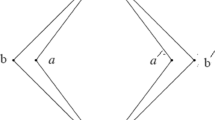Abstract
We here concentrate on equivalence relation, and show that the composition of upper approximation of one equivalence relation and the lower one of the other equivalence relation can form a lattice. We also show that this method can be used to define computational complementarity in automata.
Preview
Unable to display preview. Download preview PDF.
Similar content being viewed by others
References
Pawlak, Z.: Information systems-theoretical foundations. Information Systems 6, 205–218 (1981)
Pawlak, Z.: Rough Sets. Intern. J. Comp. Inform. Sci. 11, 341–356 (1982)
Polkowski, L.: Rough Sets, Mathematical Foundations. Physical-Verlag, Springer, Heidelberg (2002)
Gunji, Y.-P., Haruna, T.: Non-Boolean lattice derived by double indiscernibility (submitted to LNCS for rough sets)
Svozil, K.: Randomness and Undecidability in Physics. World Scientific, Singappore (1993)
Finkelstein, D.: Holistic methods in quantum logic. In: Castell, L., von Weizsacker, C.F. (eds.) Quantum Theory and the Structure of Time and Space. Carl Hanser Verlag, Munchen (1979)
Claude, C., Claude, E., Svozil, K., Yu, S.: Physical versus computational complementarity. Int. J. Theor. Phys. 36, 1495–1523 (1997)
Järvinen, J.: Lattice theory for rough sets. In: Peters, J.F., Skowron, A., Düntsch, I., Grzymała-Busse, J.W., Orłowska, E., Polkowski, L. (eds.) Transactions on Rough Sets VI. LNCS, vol. 4374, pp. 400–498. Springer, Heidelberg (2007)
Author information
Authors and Affiliations
Editor information
Editors and Affiliations
Rights and permissions
Copyright information
© 2009 Springer-Verlag Berlin Heidelberg
About this paper
Cite this paper
Gunji, YP., Haruna, T., Kitamura, E.S. (2009). Lattice Derived by Double Indiscernibility and Computational Complementarity. In: Wen, P., Li, Y., Polkowski, L., Yao, Y., Tsumoto, S., Wang, G. (eds) Rough Sets and Knowledge Technology. RSKT 2009. Lecture Notes in Computer Science(), vol 5589. Springer, Berlin, Heidelberg. https://doi.org/10.1007/978-3-642-02962-2_6
Download citation
DOI: https://doi.org/10.1007/978-3-642-02962-2_6
Publisher Name: Springer, Berlin, Heidelberg
Print ISBN: 978-3-642-02961-5
Online ISBN: 978-3-642-02962-2
eBook Packages: Computer ScienceComputer Science (R0)



